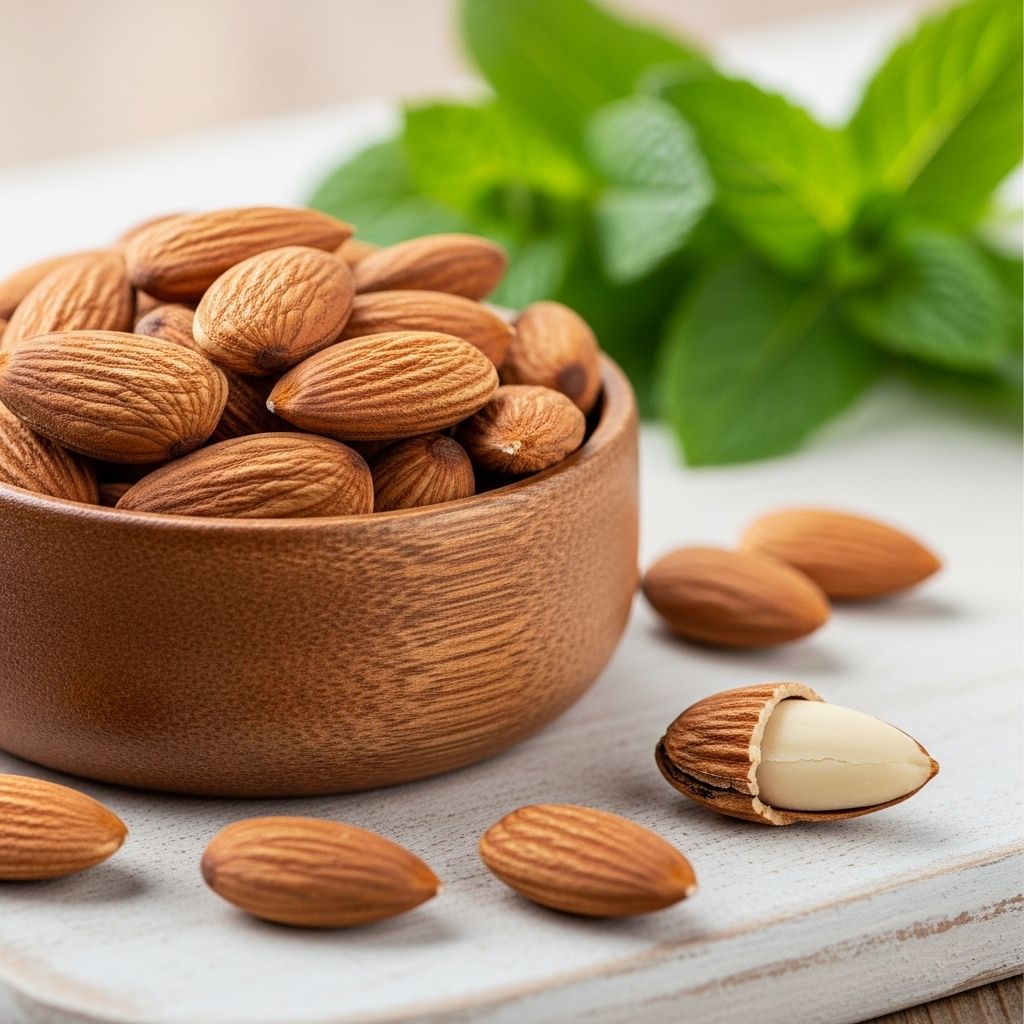Are Almonds Good for Acid Reflux? Evidence, Benefits, and Best Ways to Add Them
Discover how almonds can support digestive health and help ease acid reflux symptoms, with evidence-based strategies and tips.

Almonds and Acid Reflux: What You Need to Know
For many who struggle with acid reflux or gastroesophageal reflux disease (GERD), finding the right foods to eat can make a noticeable difference in daily comfort and long-term health. Among popular natural remedies and dietary habits, almonds often come up as a possible solution for those seeking relief from heartburn and digestive discomfort. But what does the evidence say, and are almonds truly beneficial—or can they sometimes make symptoms worse?
Understanding Acid Reflux and GERD
Acid reflux occurs when stomach acid moves upward into the esophagus, often causing a burning sensation known as heartburn. Chronic acid reflux is referred to as gastroesophageal reflux disease (GERD). Typical symptoms include:
- Heartburn (a burning feeling in the chest or throat)
- Regurgitation of food or sour liquid
- Bloating or burping
- Difficulty swallowing
- A sensation of a lump in the throat
Diet plays a central role in managing these symptoms. Some foods can trigger reflux by relaxing the lower esophageal sphincter (LES) or increasing stomach acid. Others may help to neutralize stomach acidity or soothe the esophageal lining.
Are Almonds Good or Bad for Acid Reflux?
Almonds are commonly advocated as a reflux-friendly food, but there are some important nuances to consider:
- Potential Benefits: Almonds contain healthy fats, fiber, and magnesium, all of which may help neutralize stomach acid and support digestive health.
- Possible Drawbacks: For a minority of people, eating nuts—especially in large quantities—might worsen reflux symptoms due to their fat content or by causing mechanical irritation in the esophagus if not chewed thoroughly.
What Does the Science Say?
Current clinical research on almonds and GERD is limited, but several studies and health organizations note these points:
- Almonds have an alkaline effect: Almonds may help neutralize stomach acid thanks to their alkaline nature and content of healthy fats and fiber.
- Soaked almonds may be gentler: Soaking almonds removes certain enzyme inhibitors and makes them easier to digest, potentially reducing irritation for those with sensitive stomachs.
- Fiber is key: Almonds are a modest source of dietary fiber, helping to regulate digestion and prevent constipation—a condition that can make reflux symptoms worse.
- Portion size matters: Moderation is important, as large servings of fatty foods (even healthy fats) can cause the LES to relax, aggravating reflux in some individuals.
The Benefits of Almonds for Digestive and Overall Health
Beyond possible short-term relief from acid reflux, almonds support digestive and broader health in several ways:
- Healthy fats: Almonds supply monounsaturated and polyunsaturated fats that support heart health and may help buffer stomach acid.
- Rich in fiber: Aids in digestive regularity and supports gut health, essential in managing acid reflux and bloating.
- Source of magnesium: Helps relax the gastrointestinal tract muscles, contributing to normalized digestive function.
- Antioxidant content: Almonds offer antioxidants and vitamin E, which may help reduce inflammation in the gastrointestinal tract.
- Supports immunity: Nutrient-rich almonds help maintain a healthy immune system, which can be affected by chronic reflux and esophageal irritation.
- Weight management: Eating almonds as a snack can promote satiety and prevent overeating, helping to prevent weight gain—a key risk factor for GERD.
Soaked Almonds vs. Raw Almonds for Acid Reflux
While both raw and soaked almonds can be consumed, soaking almonds is often recommended for individuals with GERD or sensitive digestion. Here’s why:
- Improved digestibility: Soaking removes enzyme inhibitors and tannins that may irritate the stomach, especially in people prone to reflux or indigestion.
- Smoother texture: Soaked almonds are softer and easier to chew, reducing the risk of undigested fragments irritating the esophagus.
- Nutrient absorption: Removing the skin after soaking can improve nutrient bioavailability, ensuring optimal absorption of vitamins and minerals.
Tip: To prepare soaked almonds, place 5–10 raw almonds in water overnight (about 8 hours), then drain and peel the skins before eating them on an empty stomach for maximum benefit.
How Many Almonds Should You Eat for Acid Reflux?
Moderation is essential when eating almonds for acid reflux:
- Recommended serving: 5–10 soaked almonds per day, preferably consumed in the morning.
- Larger portions may increase fat intake and potentially worsen reflux for some individuals.
- Chew almonds thoroughly to reduce irritation and aid digestion.
Comparing Almonds with Other Reflux-Friendly Foods
| Food | Main Benefit | Notes |
|---|---|---|
| Almonds | Neutralize acid, support gut health | Best soaked, eaten in moderation |
| Bananas | Alkaline, rich in fiber | Protects esophageal lining |
| Oats | High fiber, soothing | Helps regulate digestion |
| Low-fat yogurt | Probiotics, protein | Soothes and normalizes gut function |
| Leafy greens | Alkaline, low fat/sugar | Light and easy to digest |
| Ginger | Anti-inflammatory | Can help inhibit acid production |
Almonds pair well with other low-acid, high-fiber foods for a balanced reflux-management strategy.
Best Ways to Include Almonds in a Reflux-Friendly Diet
- As a snack: Eat a handful of soaked, peeled almonds between meals.
- In oatmeal: Chop and sprinkle almonds over whole-grain oatmeal for extra texture and healthy fats.
- With yogurt: Combine almonds with low-fat, unsweetened yogurt for a cool, gut-soothing snack.
- In smoothies: Blend a small amount of almonds into green smoothies for added creaminess.
- Almond butter: Use plain, natural almond butter (in reasonable amounts), avoiding varieties with added oils or sugars.
Avoid overconsumption and limit ingredients like salt, sugar, and added fats that can worsen reflux symptoms.
When Almonds Might Make Reflux Worse
While many find almonds helpful, there are situations where they could contribute to symptoms:
- Eating too many: Consuming large quantities increases fat intake, possibly relaxing the LES and worsening reflux.
- Individual sensitivity: Some people have difficulty digesting nuts, which could lead to bloating, discomfort, or increased heartburn.
- Allergies: Anyone with an almond or tree nut allergy should strictly avoid almonds.
- Unsoaked/raw almonds: Raw almonds may be harder to digest for those with sensitive stomachs compared to soaked almonds.
Almonds, Almond Milk, and Almond Butter: Which is Best?
- Soaked whole almonds: Provide the most digestive benefits due to their fiber, magnesium, and gentle nature after soaking.
- Almond milk: Can be suitable, but always check for added ingredients (like gums or carrageenan) that may aggravate reflux in sensitive listeners. Opt for unsweetened, unflavored varieties.
- Almond butter: Use plain varieties in moderation—it offers similar nutrients, but eating too much can increase fat intake and reflux risk for some.
Other Diet and Lifestyle Tips for Acid Reflux
- Eat small, frequent meals instead of large ones to avoid overfilling the stomach.
- Avoid eating late at night and stay upright after meals.
- Limit or avoid common triggers, such as spicy foods, chocolate, citrus fruits, tomatoes, and high-fat foods.
- Maintain a healthy weight to reduce pressure on the stomach and LES.
- Elevate the head of your bed to minimize nighttime reflux.
- Stay hydrated with water, but avoid carbonated beverages.
- Chew food thoroughly and eat slowly to support digestion.
Frequently Asked Questions About Almonds and Acid Reflux
Q: Do almonds really help acid reflux?
A: Almonds may help neutralize stomach acid and relieve reflux symptoms for many people, especially when soaked and eaten in moderation. Their alkaline nature, fiber, and healthy fats contribute to digestive comfort.
Q: Are roasted or salted almonds fine for GERD?
A: Roasted and salted almonds may irritate the esophagus or increase sodium intake. For optimal benefits, choose raw, unsalted, soaked almonds.
Q: Can eating too many almonds cause heartburn?
A: Yes, excessive almond intake can increase fat consumption, possibly worsening reflux in sensitive people. Stick to 5–10 soaked almonds per day.
Q: Is almond milk good for acid reflux?
A: Almond milk can be soothing if unsweetened and free of additives. Always watch for thickeners or added sugars, which may cause symptoms in certain individuals.
Q: Who should avoid almonds entirely?
A: Anyone with a tree nut allergy or those who have noticed consistent symptom worsening after eating almonds should avoid them.
Key Takeaways
- Soaked almonds in moderation may help neutralize stomach acid and support overall digestive health.
- Almonds are best included as part of a balanced, reflux-friendly diet alongside other alkaline, high-fiber foods.
- People with GERD should avoid large portions and monitor their own symptoms, as individual tolerance varies.
- Other heartburn-soothing foods include bananas, oats, low-fat yogurt, leafy greens, and ginger.
- Diversify your diet for best results, and ask your healthcare provider for personal guidance if you have persistent reflux or digestive issues.
Read full bio of Sneha Tete












